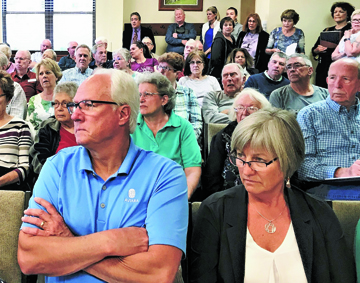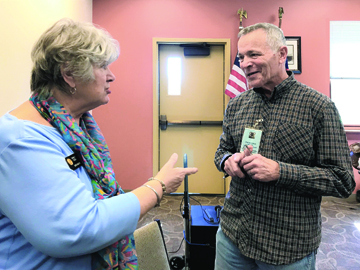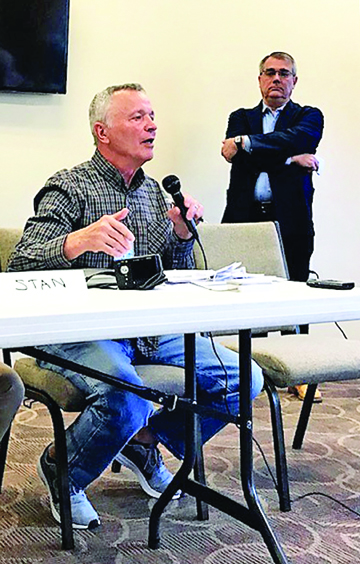Capacity Crowd Demands More Transparency
by Ruthy Wexler
The reason a group of residents pleaded with legislators to hold an HOA Town Hall early in April was that one of the few regulatory measures the Colorado legislature has applied to HOAs (Home Owner Associations) is that the property managers (community association managers, or CAMS) hired to run them must be licensed, and that licensing law, sunsetting July 19, 2019, was up for discussion and vote mid-April. State senators Nancy Todd and Rhonda Fields and state representatives Mike Weissman and Janet Buckner not only agreed to hold the HOA Town Hall on April 6, 2019, but assembled a panel of experts for the event. Well over 100 residents attended, writing their questions down on the 3×5 cards provided by the four legislators, who assured the standing-room-only crowd that the cards would be kept and studied. “The result,” said Weissman, “would be a document we will all share widely.”

Capacity Crowd: Over 100 HOA homeowners showed up for the April 6 HOA Town Hall at Heather Gardens. Most of their requests focused on: 1) more disclosure and transparency for costs such as home sale transfer fees; 2) a way to settle disputes between homeowners and their HOAs that does not involve going to court; and 3) legislative support for the above. Many expressed disbelief that solutions to these problems could be so difficult.
The panelists — attorneys Suzanne Leff and Brian Matise; Jefferey Riester, from the state HOA office; realtor Jim Smith and homeowner advocate Stan Hrincevich — barely made a dent in the pile of cards, most of which voiced concern about, as a longtime Denver realtor put it, “moral and ethical transgressions” by the very entities supposedly there to support homeowners. When one homeowner complained that her management company refused to give her the financial records she’d requested — and Leff, a partner at Winzenburg, Leff, Purvis & Payne, assured the woman she has a “perfect right under the law to those records” and suggested something the woman had already done (put the request in writing) the audience groaned in unison.
‘I know, I know,” empathized Leff. “But I urge you to use those avenues … when communities work well it is wonderful. I want communities to work!”

If a partner in a law firm that “practices community association law on a daily basis” wants HOA communities to work — if legislators, as they asserted, want HOAs to work better for homeowners — and if homeowners desperately want their communities to work — then what is the problem?
Up To You
One step in the direction of making HOA communities work better was the establishment, in 2011, of the Colorado HOA Information & Resource Center, under the Department of Regulatory Agencies (DORA). This office was originally conceived as an ombudsman, or advocate for homeowners. Now, explained Riester, Director of Legislative Affairs for that office, “we provide information, tell homeowners what rights they have under the law, accept complaints and compile those complaints in a report that goes to the General Assembly.”
“When we file a complaint with your office, it doesn’t go anywhere,” said an older gentleman.
“At this time,” Riester said, “there are no bills that would increase the teeth of this office to enforce complaints.”
“Short of filing suit, where can homeowners go?” asked the gentleman.
“We don’t provide legal advice,” Reister said. “Just: these are the facts, now it’s up to you to do what you have to do.
“Our department is currently up for sunset review,” he added. “So please, if you think the office should have more teeth, give input.”
Hrincevich, who founded Colorado HOA Forum five years ago to “improve HOA governance through legislative reform,” took the mic.
“Here is what you’re not being told,” he began.
Bunk
“When the HOA office was created, the law provided for that office to investigate complaints,” Hrincevich said. “Right before the law was complete, that was taken out.

“Then in 2013 the CO legislature directed a study of HOAs in Colorado. The [resultant] study recommended that the HOA Office install out of court dispute resolution process for homeowners.”
“You have to be very careful with alternate dispute resolution,” interjected Matise, whose practice at BurgSimpson includes general counsel for homeowner associations. “It would be expensive.”
“That is bunk,” Hrincevich said. “It’s bunk to say it would cost money or be too hard. All the groundwork has been laid. Don’t need a committee. Don’t need any further studies. We keep riding politicians to do what the 2013 study recommended. But they ignore us.”
Profit Center
The discussion touched on various subjects like street jurisdiction (HOAs or city?) and disabled parking spots (how to get one), to which the panel had various, legalese-laden answers, but when the subject of Transfer Fees arose, there was no ambiguity. Panelists and residents agreed that the fees management companies charge for an HOA home sale were excessive and unjustified. Jim Smith, who has penned several Denver Post columns about “predatory transfer fees” said, “It’s nothing but a profit center for these companies.”
“When I was about to close,” said former HOA homeowner Nancy Markow, “I needed a status letter (showing dues currency) which I printed out myself. But they charged $150, then charged for that letter to go through something called Association Online, then through a company called Homeline for an additional….”
In the end, Markow paid almost $1,000 in transfer fees.
Depending On Legislation
The discussion kept circling back to the CAM Licensing law. The four legislators said they were in favor of continuing licensing. Buck Bailey, a property manager, thought the current way CAMs have been licensed wasn’t working. Weissman said, “CAM is a profession that can control your property and your money.
“That’s why we want HB 1212 to pass,” said Weissman.
A realtor observed how much responsibility lies on the shoulders of the HOA board, who have to negotiate contracts with the management company, a “problem,” she said, because these volunteer homeowners “do not know how to read a contract or have any idea of contract vocabulary.”
“These boards are running roughshod over homeowners,” said Teri Chavez.
“Board members do just what they want … because they can,” expostulated Candice Compton.
Panelists, acknowledging the ultimate power of HOA boards, advised a “can’t lick ’em, join ’em” approach.
“Become more engaged,” said Matise.
“If you don’t like what’s going on,” said Weissman, “get on the board and change it up.”
Homeowner Judy McGree Carrington protested. “You are looking at this from a privileged perspective,” she said. “The neighborhood I’m in is filled with working class people. They don’t have time to attend HOA meetings. They’re coming in from work, making dinner. When they do go, they’re shouted down.
“This is why,” emphasized Carrington, “we are depending on legislation. Because you can’t legislate morality. But you can legislate behavior.”
Challenge
“Before we leave,” said Hrincevich, “I would like each of the legislators to say they’ll support a bill for out of court dispute resolution. Without that, you can forget all about your governing documents, your state law, because there is simply no enforcement.”
Weissman finally broke the silence. “I am not willing to take away anyone’s right to go to court.”
Weissman was assured court would always be an option.
Buckner said, “I don’t know what the final bill will look like so I really can’t say.”
Fields said, “I don’t think I understand the subject enough to give you an answer,” Todd finally said, “[Homeowners] have to be protected. We’ll figure out something,” and the room burst into applause.
“This is my 15th year as a legislator,” exclaimed Todd, who is retiring, “and I just hope …, I never hear the word HOA again!”
Mystery
“HOAs are supposed to run on democracy,” said Teri Chavez, “but homeowners develop apathy because it doesn’t work out that way.”
“The rampant abuse of HOA boards and management companies will not end anytime soon if we are to depend on legislation,” said the realtor.
The legislators, on the other hand, voiced approval of what Fields called “a rich, thoughtful and constructive town hall.”
“I was shocked and disappointed that the legislators wouldn’t commit to anything being asked of them, however reasonable,” said Smith.
Hrincevich called the event “ornamental,” adding, “Legislators know these issues. Why they don’t do anything … is a mystery. “
Many have said that the reason legislators do not respond to homeowners’ needs is the presence of a powerful national lobby, the Community Association Institute (CAI), which represents the interests of management companies and HOA attorneys and other vendors benefiting from the HOA industry. (CAI’s membership is only 2% homeowners.)
One week after the HOA Town Hall, Hrincevich viewed a letter national CAI sent to its Colorado membership: that read in part, “We need you to email or call members of the Finance Committee and let them know you support HB 1212.” The letter explained how the bill had been “preamended” and “is the version we support.” The letter promised, “Bonus points if you can testify!”
“All our recommended changes were ignored,” Hrincevich said, “resulting in an ineffective licensing program. But CAI and special interests were able to preamend this bill. In other words, the industry that is to be regulated has successfully influenced the sponsors of this bill to include their interests. Is this the way government is supposed to work for the people?”
